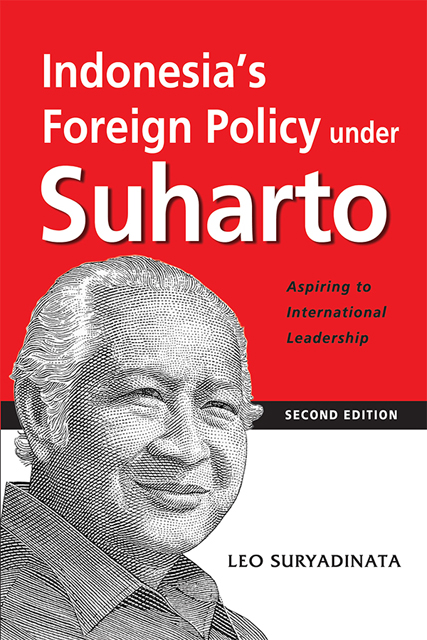Book contents
- Frontmatter
- Contents
- Preface to the Second Edition
- Preface
- Acknowledgements
- Introduction: Suharto’s Foreign Policy
- 1 Determinants of Indonesia’s Foreign Policy: In Search of an Explanation
- 2 Indonesia’s Foreign Policy before the New Order: In Search of a Format
- 3 Indonesia’s Foreign Policy during the “New Order” (I): The Rise of the Military
- 4 Indonesia’s Foreign Policy during the “New Order” (II): The Assertive Role of the President
- 5 Indonesia’s Relations with the ASEAN States: Regional Stability and Leadership Role
- 6 Indonesia’s Relations with Australia and Papua New Guinea: Security and Cultural Issues
- 7 Indonesia-China Relations: Ideology, Ethnic Chinese and the President
- 8 Indonesia-Vietnam Relations and the Kampuchean Issue: The Security Factor
- 9 Indonesia-Superpower Relations: Economic and Non-Economic Factors
- 10 Indonesia, the Middle East and Bosnia: Islam and Foreign Policy
- 11 Indonesia, the Non-Aligned Movement and APEC: In Search of a Leadership Role
- Conclusion: To Lead and Not to Be Led
- Postscript: Indonesia’s Foreign Policy from the Fall of Suharto to Joko Widodo: Still Aspiring to International Leadership?
- Bibliography
- Appendices
- Index
10 - Indonesia, the Middle East and Bosnia: Islam and Foreign Policy
Published online by Cambridge University Press: 01 September 2023
- Frontmatter
- Contents
- Preface to the Second Edition
- Preface
- Acknowledgements
- Introduction: Suharto’s Foreign Policy
- 1 Determinants of Indonesia’s Foreign Policy: In Search of an Explanation
- 2 Indonesia’s Foreign Policy before the New Order: In Search of a Format
- 3 Indonesia’s Foreign Policy during the “New Order” (I): The Rise of the Military
- 4 Indonesia’s Foreign Policy during the “New Order” (II): The Assertive Role of the President
- 5 Indonesia’s Relations with the ASEAN States: Regional Stability and Leadership Role
- 6 Indonesia’s Relations with Australia and Papua New Guinea: Security and Cultural Issues
- 7 Indonesia-China Relations: Ideology, Ethnic Chinese and the President
- 8 Indonesia-Vietnam Relations and the Kampuchean Issue: The Security Factor
- 9 Indonesia-Superpower Relations: Economic and Non-Economic Factors
- 10 Indonesia, the Middle East and Bosnia: Islam and Foreign Policy
- 11 Indonesia, the Non-Aligned Movement and APEC: In Search of a Leadership Role
- Conclusion: To Lead and Not to Be Led
- Postscript: Indonesia’s Foreign Policy from the Fall of Suharto to Joko Widodo: Still Aspiring to International Leadership?
- Bibliography
- Appendices
- Index
Summary
Introduction
The influence of the military and President Suharto can also be seen in Indonesia’s policy towards the Middle East and Bosnia. This chapter examines whether Islam is the major factor in determining Indonesia’s relations with the Islamic and Muslim states, with special reference to the Middle East and Bosnia. Six cases are briefly studied: Jakarta’s policy towards the PLO, revolutionary Iran, the Organization of Islamic Conference (OIC), the Soviet occupation of Afghanistan, the Iraqi invasion of Kuwait and the religious conflict in Bosnia.
The Islamic Factor
As a country where Muslims make up the majority of the population, Indonesia is assumed to have close relations with the Islamic Middle East. When Indonesia-Middle East relations are examined, however, it turns out that they have been dictated by many considerations other than Islam. It is true that long before the transfer of political power in 1949, Indonesian officials had come into contact with many Middle-Eastern states. Owing partly to the activities of Indonesian students and partly to the efforts of Haji Agus Salim (a respected Indonesian Islamic figure who later became Foreign Minister), the Islamic states such as Egypt, Iraq and Syria supported the Indonesian nationalist struggle. They were one of the earliest groups of countries which recognized Indonesian independence. However, Indonesia-Middle East relations did not expand rapidly.
During the Parliamentary Democracy period (1949-1956), when political parties were in power, Islamic parties such as Masyumi and NU were assumed to have introduced more Islamic foreign policy, but this was not the case. Even when Sukiman of Masyumi was Prime Minister, his foreign policy was very pro-American. This was during the Cold War period when Muslims sided with non-Communists in order to survive. In addition, the Islamic rebellions in Indonesia made identifying closely with Islam appear unpatriotic. This may explain why Indonesia’s foreign policy, even when an Islamic party was a major partner in the ruling coalition, was still non-Islamic.
From the beginning, Indonesia has adopted a policy of non-recognition towards Israel. Indonesian sympathy has been with the Arabs, who are Muslims. This policy has often been seen as reflecting Indonesia’s close association with its Islamic brothers. However, if the situation is studied more closely, it can be seen that these relations were based on Third World nationalism rather than co-religious solidarity.
- Type
- Chapter
- Information
- Indonesia's Foreign Policy under SuhartoAspiring to International Leadership, pp. 158 - 171Publisher: ISEAS–Yusof Ishak InstituteFirst published in: 2023

